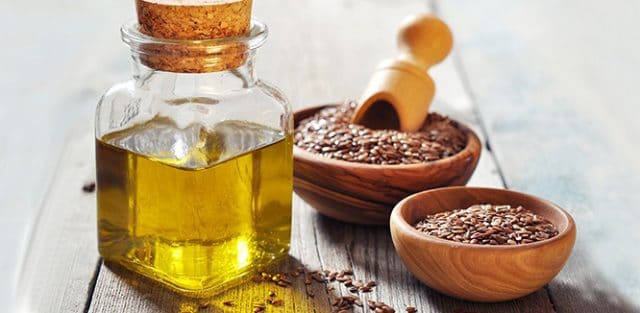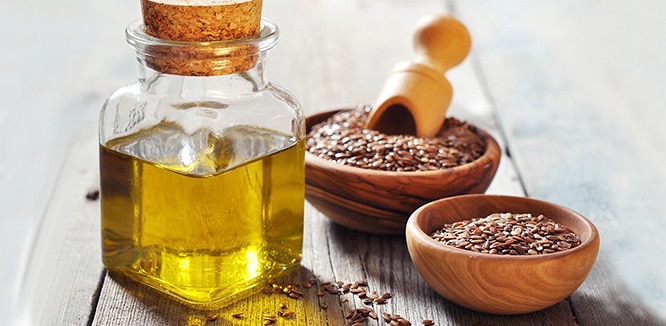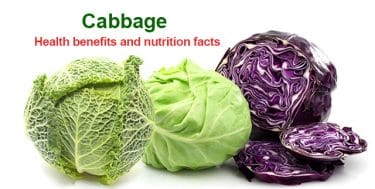
Table of Contents
What is flaxseed?
Flax is a member of Linum genus and it blossoms yellow or blue colored soft flowers in summer time. It has been cultivated for its fibers and seeds for 4000-5000 years in the Near East and Mediterranean regions. It is also being produced in many areas around the world. Flax plant prefers mild climate. Its fruits grow ripe in the summer and can have sizes up to 60 cm. Flax is cultivated both for its fiber and its seeds.
The seeds contain 40-45% fat and are used to obtain oil. Flax is a rich source of Omega 3 fatty acids. Also known as “linseed”, flax is used in dyeing as well. Seeds are used as animal feed after their fat content is extracted.
Nutrition facts of flax seeds
One teaspoon (2.5 gr) of flaxseed contains below nutrients and vitamins: 13 calorie, 0.72 gr carbohydrate, 0.5 gr protein, 0.7 gr fiber, 0.9 gr unsaturated and 1 gr fat, 6 mg calcium, 10 mg magnesium, 16 mg phosphorous, 20 mg potassium, 1 mg sodium, 0.11 mg zinc and vitamin K.
How to use flax seed?
The best way to consume flax seed is to use it with sprouts. Soaking and then sprouting the seeds extracts phytic acid and increases mineral absorption. Seeds can be soaked in warm water for 10 minutes and 2 hours in cold water.
Seeds can be added to cereals in the morning. In addition, as ground flaxseeds are like powder, they can be added into many foods. The healthiest and most practical way to use whole flaxseed is to eat them by mixing with a bowl of homemade yoghurt.
Combination of homemade yoghurt, which is rich in probiotics and flaxseeds has great health benefits. Soak 1-1.5 tablespoons of flaxseeds in hot water and wait for some time. Put them softened with hot water into a bowl of homemade yoghurt. This mixture will accelerate digestive system and help gradually getting rid of body fat.
Health benefits of flaxseed
Although there are many resources on the medicinal effects of flax seed, scientific studies are limited. However, consumption of small amount of it from time to time is known to have positive contribution on overall health. It also contains nutrients that help preventing some health problems.
People with chronic diseases should consult their doctor before use. Cancer prevention, cholesterol and blood pressure reduction, protection against radiation are among its benefits. And flax seed consumption allows the body to absorb nutrients more effectively.
- Regulates blood pressure and prevents high pressure.
- Flax seed is also helpful for the regulation of digestive system functions. It cleans the stomach and intestinal membranes and prevents inflammation.
- When flaxseeds reach stomach they inflate and fill the intestine, alleviating hemorrhoids.
- With its Omega 3 fatty acid content, flaxseed also prevents dry skin and provides brightness.
- Supports the activities of brain. Flaxseed is effective against dementia and helpful for the prevention of Alzheimer’s disease thanks to its vitamin B12 content.
- Vegetarian people can meet their vitamin B12 needs with flaxseed.
- Flax seed is also a healthy alternative for people who want to lose weight as it supports the functions of the digestive system and prevents fat deposition in the body.
- As it inflates in the stomach, it suppresses appetite by giving a sense of fullness.
- It also supports fluidity inside the cellular structure with its Omega 2 content.
- It also protects against diabetes by balancing the blood sugar.
Benefits of flaxseed for cancer
Flaxseed is rich in Omega-3 fatty acids. These fatty acids are thought to prevent growth and development of cancerous cells. And the lignans in its content is believed to have anti-angiogenic properties. These lignans can help protect against various cancers if used as part of a healthy diet or lifestyle. In a study with 161 individuals, the growth of prostate tumors in male, who consumed flaxseed together with a diet low in fat, were observed to be prevented. Flaxseed is also found to lower the risk of breast cancer.
Effect of flaxseed on diabetes
Lignans and other phytoestrogens may lower the risk of chronic diseases like diabetes thanks to their anti-inflammatory effects. In a study conducted with 99 prediabetic individuals in 2016, daily flaxseed consumption was shown to reduce blood pressure in prediabetic (first stage of diabetes) individuals, however, did not improve blood sugar and insulin resistance.
In spite of many studies, benefits of flaxseed on diabetes symptoms are not clear yet. Therefore, people on diabetes treatment should consult their doctor before adding flaxseed to their diet.
Benefits of flaxseed oil
High contents of unsaturated fat, potassium, zinc and n-3 fat makes flaxseed one of the most recommended nutrients by dieticians. Unless used excessively, flaxseed is always helpful for the body and it is recommended to be used one dessert spoon a day or one tablespoon once in every week.
- Flaxseed oil is also said to have benefits for respiratory tracts.
- It protects against inflammation and infection of the skin
- Flaxseed is also effective against eczema, fungal infections and psoriasis
https://www.healthandmedicine.net/what-is-psoriasis-symptoms-causes-and-treatment/
- It heals stomach and intestine related problems
- Alleviates pain due to sunburn and accelerates the healing process
- Omega-3 fatty acids inside the flaxseed have benefits on hair health
- Some studies showed that flaxseed oil can lower the risk of prostate, breast and chest cancers.
- Decreases the risks of skin disease. Some experts state that it can also decrease the risk of gout disease.
- Flaxseed oil is also said to have positive effects on nervous system
- It is known to be effective against menopausal problems
- Flaxseed oil can reduce rheumatic pain
- It cleans the intestines and helps healthy intestinal function with its anti-oxidant properties.
Does flaxseed help weight loss?
Flaxseed contains fiber, fat, protein and various vitamins and minerals. In addition to the burning unnecessary fat, it also stimulates intestines, giving them a gel-like soft inner tissue and prevents constipation. Thus, flaxseed is among the best nutrients that support weight loss.
Eating ground flaxseed mixed with yoghurt for snack extends the sense of fullness, preventing people from eating too much. Flaxseed can meet energy requirements since its fatty oil content is absorbed as they pass through the intestinal tract.
Its fiber content can help people to lose weight in a healthy way. In a weight loss plan, it is better to consume vegetable oils instead of animal fat.
Flaxseed with yoghurt
Eating yoghurt with flaxseed can help many diseases and problems. Flaxseed contains high amount of polyunsaturated fatty acids and very low amount of saturated fatty acids in addition to its fiber content. And it is also rich in potassium and contains small amounts of other vitamins and minerals like magnesium, zinc, iron and copper.
High calcium content of yoghurt provides the nutrients necessary for the body. Eating these two helpful foods together also has the following benefits:
- They have anti-oxidant properties
- Reinforce the immune system
- They have healing effects on rheumatoid, arthritis, psoriasis, allergies and other inflammatory diseases with the anti-infective substance content
- Act as a shield against flu and other infectious diseases
- Increase the resistance of the body and help people feel fresh and energetic
- Increase the strength of the elements that enhance the body
- Used for the treatment of eczema and psoriasis
However, maximum daily amount of flaxseed should not exceed one or 1/2 teaspoon. Otherwise it may do more harm than good.
Flaxseed recipes
Flaxseed tea
You can make tea from flaxseed. Add 1 teaspoon or dessert spoon of flaxseed into 1 glass of boiled water, wait for 10 minutes, filter and drink. This tea should be prepared fresh every day and should not be consumed more than 1 glass a day.
Cookie with Flaxseeds
Ingredients:
- 125 gr butter or margarine at room temperature
- Half tea glass of oil
- 1 tea glass of powdered sugar
- 1 tea glass of coarsely ground flaxseed
- Half pack of baking powder
- 1 pack of vanillin
Preparation:
Put all ingredients in a large bowl, mix and make dough. Spread flour to the counter and spread small portions of dough with a roller, be careful not to make them too thin. Cut pieces from the dough with a mold and bake them in a pre-heated 170° oven until pink.
Smoothie with Flaxseeds
This quick and healthy recipe will energize you.
Ingredients:
- 1.5 glass of lactose-free milk
- Half banana
- 1 table spoon of yoghurt
- 1/4 teaspoon of ginger powder
- 1 teaspoon of cinnamon
- 1 tablespoon of flaxseed
Preparation: Peel the banana and slice. Put lactose-free milk, yoghurt, banana slices, flaxseeds, ginger powder and cinnamon into a blender. Mix the ingredients until obtaining puree. Eat without waiting.
Salad with Flaxseed
This salad is especially helpful for people who are on weight loss diet.
Ingredients:
- 1 iceberg lettuce
- 1 yellow capsicum
- 10 cherry tomatoes
For the sauce:
- 1 tablespoon of flaxseeds
- 1 dessert spoon of vinegar
- 3 tablespoons of extra virgin olive oil
- 1 lemon
- 1 teaspoon of salt
Preparation: Prepare the sauce by mixing flaxseeds, salt, vinegar, lemon juice and olive oil in a small bowl. Wash, soak, drain, chop and put the iceberg lettuce leaves into a salad bowl. Mince the capsicum and cherry tomatoes and add to the salad. Pour the sauce in the salad
Side effects of flaxseed
- As flaxseed can lower blood sugar levels, people using diabetes medication should be careful to avoid low blood sugar problem.
- Flaxseed can significantly lower the blood pressure. Therefore, people on blood pressure medication should exercise caution.
- As flaxseeds may slow coagulation, people with coagulation disorders should not use. In addition, flaxseed consumption must be ceased at least two week prior to an operation.
- Hormones inside flaxseed can mimic the estrogen hormone and this may worsen hormone-sensitive diseases like breast, uterine and ovarian cancers and uterine fibroids.
- Its action mechanism similar to estrogen can also cause problems in pregnant and breast-feeding women. Please consult your doctor before use.
- People who consider using flaxseeds as an alternative or complementary treatment should consult their doctor first.
References: 1- Healthy food trends - flaxseeds, 2- Health Benefits of Flax Seeds, 3- Benefits of flaxseed oil




